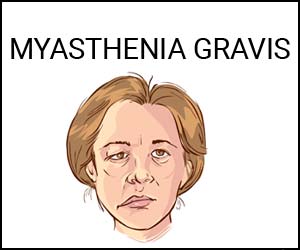- Home
- Editorial
- News
- Practice Guidelines
- Anesthesiology Guidelines
- Cancer Guidelines
- Cardiac Sciences Guidelines
- Critical Care Guidelines
- Dentistry Guidelines
- Dermatology Guidelines
- Diabetes and Endo Guidelines
- Diagnostics Guidelines
- ENT Guidelines
- Featured Practice Guidelines
- Gastroenterology Guidelines
- Geriatrics Guidelines
- Medicine Guidelines
- Nephrology Guidelines
- Neurosciences Guidelines
- Obs and Gynae Guidelines
- Ophthalmology Guidelines
- Orthopaedics Guidelines
- Paediatrics Guidelines
- Psychiatry Guidelines
- Pulmonology Guidelines
- Radiology Guidelines
- Surgery Guidelines
- Urology Guidelines
Hypophonia as only presenting symptom in myasthenia gravis: a case report

Dr Avinash Chandra at Department of Neurology, Annapurna Neurological Institute and Allied Sciences, Kathmandu, Nepal and colleagues have reported a rare case of Hypophonia as only presenting symptom in myasthenia gravis.The case has appeared in the Journal of Medical Case Reports.
A 51-year-old Madheshi woman came to our neurology clinic with the chief complaint of a sudden decrease in the tone and texture of her voice for the past 15 days. Her voice was very feeble but understandable and she noticed it was better by the time she got up from her bed only to worsen through the day to become nearly inaudible. She had noticed a slight change in her voice texture in the first several days which she had ignored in the beginning as it was not worth bothering about. She had no complaint of choking or coughing or aspiration or any throat discomfort. When asked for any other related and/or unrelated things she noticed in her habits, she complained about having constipation for many years otherwise she was apparently well. She had never visited hospital for any problem and no interventions had been done in the past. She denied smoking tobacco, drinking, or any other recreational drugs abuse. There was no one in her family or her parents’ family with any kind of known chronic disease. Her biological father had controlled hypertension with medication. Her psychosocial history was not significant. She came from a middle-income family, and she had retired recently as an accountant for a small company. Her symptom progressively aggravated in later days to the extent that she not able to produce sound properly. It usually waned in the early morning or after enough voice rest only to wax throughout the day.
On physical examination, a systemic examination did not reveal any abnormality. On neurological examination, her muscle power was intact: 15/15 on Medical Research Council (MRC) scale. She had no imbalance and was able to tandem on walking. An examination of her gag reflex and other cranial nerves revealed no abnormal reflexes. Deep tendon reflexes were intact. Her speech articulation was intact and revealed no scanning of speech. Speech production was adequate and non-painful; her tone was non-nasal but the intensity was low and slow. Other neurological examinations also did not reveal any abnormality. Other systemic examinations were also non-significant.
Concerned with her problem, she had visited an ear, nose, and throat (ENT) department for her problem and was screened for possible laryngeal disorder for hypophonia. There was no obvious laryngeal pathology found and the treatment initiated by the ENT department had no satisfying outcome. She visited our neurology clinic. The differential diagnoses considered were Parkinson’s disease (PD) or a bulbar variant of motor neuron disease (MND), and MG. MRI scanning of her brain and screening of her whole spine appeared normal. Laboratory investigations including a hematologic panel, infectious disease screening panel, and myopathy panel involving creatinine kinase and creatine phosphokinase-N-acetyl cysteine (CPK-Nac), were all within normal range. She was suspected to have MG as other diseases were ruled out. A Quantitative Myasthenia Gravis (QMG) test was performed on our patient and her QMG score was 1 (for speech). She was given neostigmine challenge test with intravenously administered injection of 2.5 mg neostigmine and the result was positive after more than 30 minutes. There was significant improvement in her voice quality and she felt her fatigability improved as well. She gained a good quality of speech within an hour. QMG scoring was repeated, and she scored QMG score of 0. The longer duration of the medicine gave us enough time to assess the improvement. The laboratory test for the AchR antibody (AchR ab) is not available in Nepal. We had to send AchR ab to India, and the report received after waiting several weeks was positive. Quantitatively, it was significantly higher, 1.11 nmol/l than the normal range (0.0–0.4 nmol/l). She was later maintained on 60 mg of orally administered pyridostigmine with 12 hourly administrations and subsequently increasing to 6 hourly along with steroids.
Plain and contrast-enhanced computed tomography (CT) scans of her head, neck, and chest were done, and they revealed a mass in the anterior mediastinum: a well-defined, smooth outlined, approximately 4 × 2.5 × 2 cm, soft density nodule showing poor enhancement in the anterior mediastinum in the thymic space with maintained fat plane with the adjacent vessels and structure. Thymoma was suspected and she was sent to the surgical department for further surgical intervention.
She returned to our neurology clinic around 2 months after her first visit to us as a follow-up visit. She had undergone successful surgery. She was doing well. Prednisolone was already tapered off. She was tapering down pyridostigmine as well, with a maintenance dosage of pyridostigmine 60 mg 12 hourly and planned to put off the medication. Her voice was clear and well maintained and she had no complaint of fatigue. She had no fresh complaint and was doing all her daily and professional activities very well.

Disclaimer: This site is primarily intended for healthcare professionals. Any content/information on this website does not replace the advice of medical and/or health professionals and should not be construed as medical/diagnostic advice/endorsement or prescription. Use of this site is subject to our terms of use, privacy policy, advertisement policy. © 2020 Minerva Medical Treatment Pvt Ltd